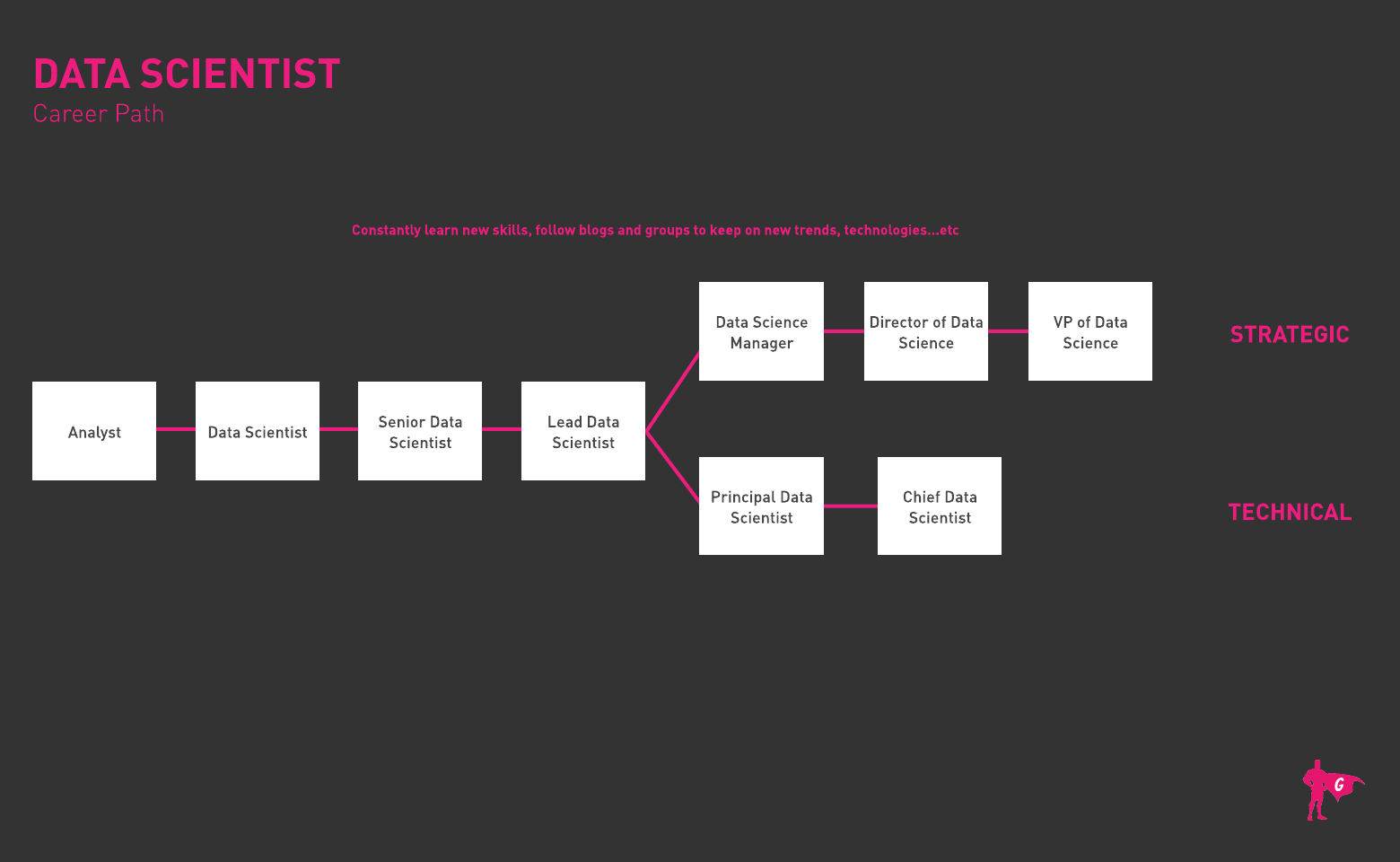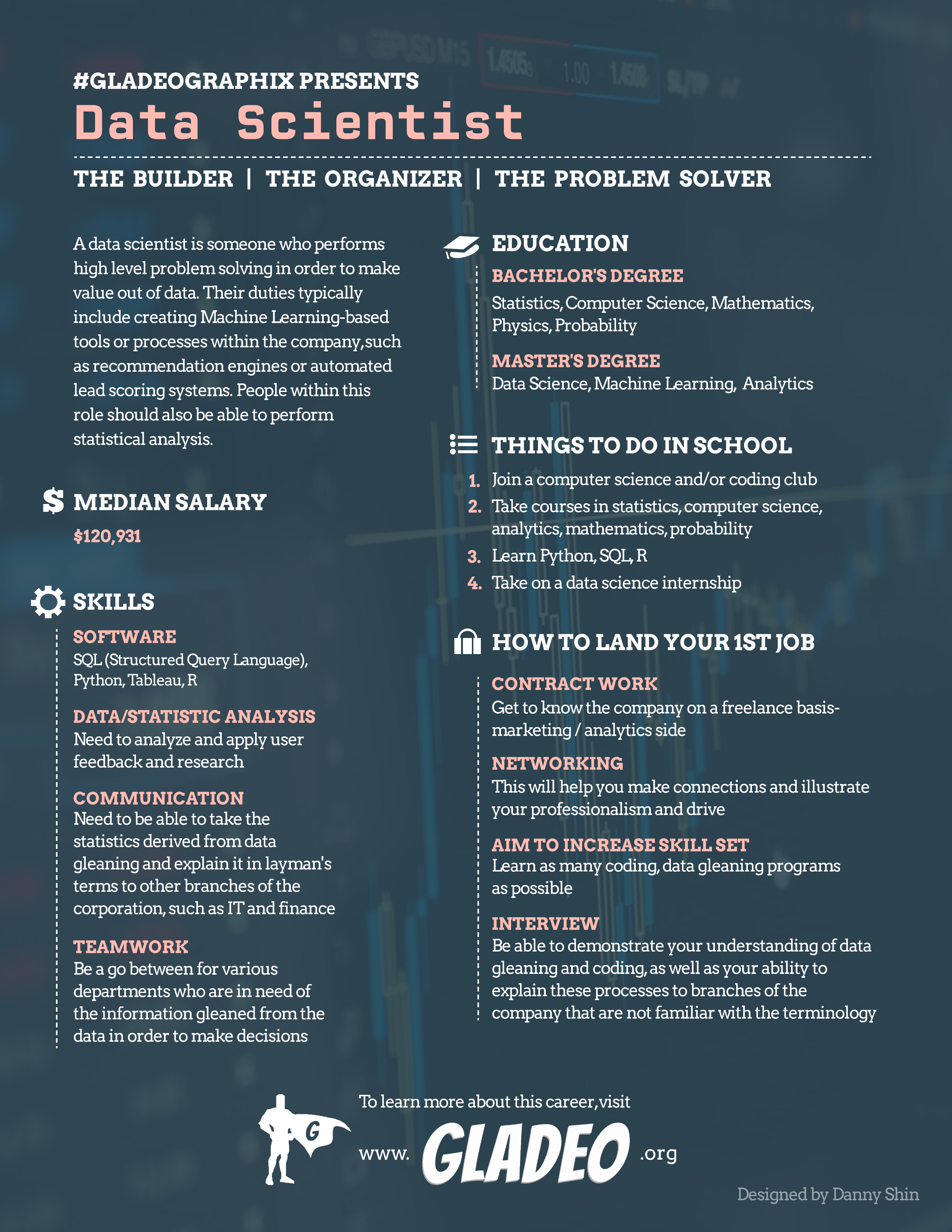Focos
Data Analyst, Data Engineer, Machine Learning Engineer, Predictive Modeler, Quantitative Analyst, Statistician, Data Strategist, Business Intelligence Analyst, Data Architect, Data Mining Specialist
The invention of the Internet and the creation of the World Wide Web started an information Big Bang that is still exploding. Although data science precedes this phenomenon, it has certainly been drastically altered by it. Modern Data Scientists rely on (and help create) cutting-edge analytical tools that they use, ultimately, to solve problems for their employers.
Described by Glassdoor as “a mix between a mathematician, computer scientist and trend-spotter,” Data Scientists use technology primarily to meet the needs of businesses. This is done through gathering, studying, and interpreting vast amounts of data pulled from a range of sources. The knowledge and insights gleaned from the work of Data Scientists help employers make well-informed, data-driven decisions that impact what services they offer, what products they make, their marketing strategies, and much more.
- Always learning something new
- Get to be a pioneer in a field that is only a decade old
- Mix of technology and science
- Can use skills to help others, i.e. healthcare data
- Every major company, corporation needs data scientists, and medium and smaller companies are working on fitting them into their budget
- Financially-rewarding profession destined to grow in the coming years
"My tasks vary every day, which makes this career a lot more exciting than other jobs where you come in and do the same thing all the time. It's all around problem solving that helps decision makers within the company get insight from data."
Working Schedule
- Data Scientists can expect full-time work, with routine schedules. As a demanding field, it is imperative to keep skills sharp, which may require “off-duty” refresher training, additional certification, and other non-paid learning experiences.
Tareas típicas
- Apply knowledge and skills to design new technologies or to maximize the use of existing ones
- Work with leadership, engineers, and external clients to identify problems
- Assist organizations with policy development and goal attainment strategies
- Collaborate with teams and manage tasks and suspenses
- Depending on specific roles, Data Scientists might work with Python, R, SQL, databases, analytic tools, machine learning, and Big Data
- Develop feasible solutions to complex software or business issues
- Develop new theories and models
- Identify hardware and software needs by talking with end-users, customers, staff, and stakeholders
- Review project concepts and offer suggestions for improvements
Responsabilidades adicionales
- Engage in multidisciplinary projects
- Run tests of new systems
- Participate in professional organizations to share research and findings
Habilidades sociales
- Able to predict problems
- Active learning
- Analítica
- Attention-to-detail
- Ability to contextualize ideas for others
- Creative and curious
- Critical (but flexible) thinking
- Decisive
- Focus
- Orderly
- Persistence and resilience
- Problem Solving
- Buen juicio
- Gran capacidad de comunicación
Competencias técnicas
- Web platform development software: SQL (Structured Query Language), Python, Tableau, R
- Communication skills: need to be able to take the statistics derived from data gleaning and explain it in layman's terms to other branches of the corporation, such as IT and finance
- Teamwork: you will be a go between for various departments who are in need of the information gleaned from the data in order to make decisions
- Data/statistic analysis: Need to analyze and apply user feedback and research
- Good vision
- Able to analyze and evaluate systems
- Basic understanding of sales and marketing, customer service, telecommunications, design, management principles, and engineering science
- Business intel/data analysis programs, such as IBM Cognos Impromptu, Oracle Business Intelligence Enterprise Edition, QlikView, and Tableau
- Compiler software, such as Polaris parallelizing compilers, Greenhills Ada compilers, and LLVM compilers
- Database management and user interface/query programs
- Development environment software, such as LabVIEW, Apache Kafka, or Eclipse IDE
- Graphics imaging
- Knowledge of analytical and scientific software, such as Minitab, StataCorp Stata, and MATLAB
- Object or component oriented development software (C++, ActiveX, Java, Python)
- Strong math skills, including algebra, geometry, calculus, and stats
- Academic institutions
- Banking and financial sectors
- Cloud services and hosting
- Consulting
- Software as a Service (SAAS), web, mobile
- Computer software publishers
- Delivery companies
- Federal government/military agencies
- Large corporations
- Retail companies
- Insurance agencies
- Telecommunications
- Other research and development organizations
- Private specialized companies
- Search/social networking
- An understanding of machine learning: a method of data analysis that automates analytical model building. Machine learning allows computers to find hidden insights using algorithms that learn from data without explicit programming
- The merging or data science and IoT: the growing network of physical objects that feature an IP address for internet connectivity, and the communication that occurs between these objects and other Internet-enabled devices and systems.
- Ability to work with RIL (radio interface layer), which goes hand-in-hand with IoT
- Use of data science in healthcare: data gleaned by these scientists can be used to predict disease trends i.e. the resurgence of Ebola
Most organizations employing Data Scientists do so because they rely heavily on the skills and information those workers bring to the table. In some cases, Data Scientists are literally developing the products or services being sold, while in other situations they’re helping companies determine what to sell, who to sell it to, and how to sell more. As a result, expectations run high, but financial compensation is also high!
According to the University of Wisconsin, entry-level workers earn up to $95,000, mid-level workers earn a median of $128,750, mid-level managers can make up to $185,000, and experienced manager median salaries can reach as high as $250,000. Clearly organizations paying these amounts will demand top-shelf expertise and value-added work. Therefore a major sacrifice, if it can be called that, is for Data Scientists to reach and maintain proficiency in all areas, and to keep up with (or ahead of) new and developing technologies. This can take a massive, long-term commitment, with much work done “after hours” on one’s own time.
Data Scientists were almost certainly interested in computers at an early age, as well as puzzles and problems they had to solve or otherwise work out. They love intellectual challenges where discovering information and how to use it are the keys to winning. Some might have enjoyed reading or watching mysteries and detective stories. They’re interested in psychology, how people think, what motivates them, and how computers can find ways to understand people better on different levels, from individuals to groups and even whole societies.
Most likely, a good Data Scientist was someone who, growing up, could see the “big picture” and how small elements, factors, or decisions could have large consequences. They may appear to be highly organized, but in their heads information is not static, it’s malleable and flexible. In other words, they can generally “think outside of the box” in order to creatively use data in ways others might not have thought of. They were also probably good at explaining technical things in layman's terms.
- Most computer and information research scientists need a master’s degree in computer science or a related field, such as computer engineering
- According to Burtch Works, “91% [of Data Scientists] have at least a Master’s degree and 48% have PhDs”
- LinkedIn mentions the following foundational bachelor’s degree majors: biostatistics, chemistry, computer science, engineering, mathematics/applied mathematics, meteorology/astrophysics, physics, or statistics
- Other common degree majors include mathematics, statistics, natural sciences, and other types of engineering
- Many Data Scientists specialize in a certain area, so having relevant academic and work experience is important. Speak with program managers and academic advisors to build a degree program tailored to your specific job goals
- There are many optional certifications, including:
- Adobe - Analytics Business Practitioner; Adobe Campaign Classic Business Practitioner
- Broadcom - Administration of Symantec ProxySG 7.2 with Secure Web Gateway
- Dell - Specialist - Data Scientist, Advanced Analytics Version 1.0; Associate - Data Science Version 2.0
- IBM - Data Science Professional Certificate
- Institute for the Certification of Computing Professionals - Associate Computer Scientist; Certified Computer Scientist
- Microsoft - Designing and Implementing a Data Science Solution on Azure
- SAP - Certified Application Associate, SAP Predictive Analytics
- SAS - Certified Data Scientist
- Some universities offer hybrid degree programs for students to knock out their bachelor’s and master’s at an accelerated pace, saving time and money
- Data Science is a broad field, with many specialty areas. The sooner you know what you want to specialize in, the better you’ll be able to pick the right major and program
- Data Scientists work on the forefront of a burgeoning field, so students should try to get into the best-funded programs they can
- Schools with great funding typically have better faculty, facilities, research opportunities, and ties to industry that can help graduates land jobs faster
- Look at every program’s post-graduation job placement rates and other bragging points
- Make sure the institution is fully accredited
- ABET-accredited computer science programs also have certain advantages
- Data Science is a suitable major for online education, for those who need flexibility. Keep in mind, online classes can be just as rigorous as on-campus ones
- Almost half of all Data Scientists hold PhDs, so consider that if hoping to stay at one institution
- Read as much as you can about the field! U.S. News’ guide on How to Learn Data Science is one great starting point
- Take college preparatory math and programming courses
- Sign up for short free or paid online courses, such as:
- Codecademy’s Analyze Data With Python
- Coursera’s Data Science Math Skills or Deep Learning Specialization
- edX’s IBM Data Science Professional Certificate
- fast.ai’s Computational Linear Algebra
- General Assembly’s Intro to Data Science Livestream
- LinkedIn Learning’s Data Science Foundations: Fundamentals
- Pluralsight’s Understanding Machine Learning With Python
- Udacity’s Become a Data Scientist Nanodegree Program
- Udemy’s Data Science Course 2020: Complete Data Science Bootcamp
- University of Michigan’s Data Science Ethics
- Also browse through YouTube, Khan Academy, and MIT OpenCourseWare for relevant videos and courses that can help you understand key concepts
- Devour books, practice coding skills, and join school organizations related to the field
- Join computer clubs, share knowledge, and put your skills into practice
- Get professionally published. Write articles for peer-reviewed sites or magazines, versus sites that allow anyone to publish anything

- The job of Data Scientist ranked #3 on U.S. News’ Best Technology Jobs list, meaning there could potentially be a lot of competition in the job market
- Many Data Science jobs are with established companies and government agencies, but tech startups, colleges, and research institutions also do a lot of hiring
Ask your school’s Data Science program managers or career center for help locating recruiters and job fairs
- Many Data Science jobs are with established companies and government agencies, but tech startups, colleges, and research institutions also do a lot of hiring
- Holding a master’s is the best bet for landing that dream Data Science job. Even if you find work with a bachelor’s, you’ll eventually need that grad degree to move up
- During college, focus on strong grades and courses you can use in your specialty area
- Join professional organizations and clubs that allow you to get practical experience while networking
- Ask professors and peers for job-seeking advice and tips about openings
- Put your school’s career center to work and get help polishing your resume and interview skills
- Ask your program’s department about job fairs and recruiter connections. Many organizations partner with good schools to recruit talent right after graduation
- Start searching job portals early to get an idea of current requirements employers are listing
- Glassdoor, Indeed, USAJobs, ZipRecruiter, Kaggle, Amazon, Dice, and LinkedIn are all great spots to find Data Science employment opportunities. Set up alerts to get a heads-up on new postings
- Steal some of Monster’s Data Scientist resume template ideas
- Get portfolio tips from Dataquest’s Data Science Portfolios That Will Get You the Job
- Peek at a few interview questions and answers and be ready when hiring managers call!
- Keep honing skills related to statistics, programming, machine learning, data management, and communications
- Knock out professional certifications
- Go big! Get your PhD when it fits into your career schedule
- Stay creative and find ways to increase your employer’s bottom line
- Keep getting published and build a reputation for yourself
- Stay an active, contributing member in professional organizations
Articles
- Report: Why "Data Scientist" Is The Best Job To Pursue In 2016 (still relevant)
- IBM Predicts Demand For Data Scientists Will Soar 28% By 2020
- These Are The Skills You Need To (Eventually) Become A $240,000+ Unicorn Data Scientist
Associations
- American Statistical Association
- DMG
- ICDM, IEEE International Conference on Data Mining
- IMLS, The International Machine Learning Society
Libros
- Doing Data Science By Cathy O'Neil, Rachel Schutt
- Data Science for Business By Foster Provost, Tom Fawcett
- Data Science from Scratch By Joel Grus
- Data Science For Dummies, by Lillian Pierson
Conferences
Blogs/Magazines/Websites
- Software Engineer
- Business Analyst
- IT analysts
- Data Architects
- IT/Software Consultants
- Big Data Engineer
Noticias

Ofertas de empleo

Cursos y herramientas en línea









